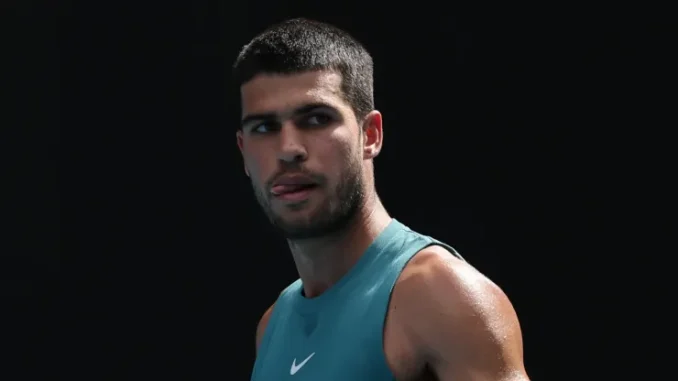
Carlos Alcaraz, the 21-year-old tennis sensation from Spain, has electrified the sport with his explosive play and unrelenting drive, amassing four Grand Slam titles and a stint as world No. 1 before most players even hit their stride. With his dazzling forehands and gravity-defying athleticism, he’s often compared to Rafael Nadal, the 22-time major champion who’s long been the gold standard of Spanish tennis. Yet, as Alcaraz carves his own path to greatness, he’s quick to shine a spotlight on another Spanish icon—a former world No. 1 who’s been the quiet force behind his meteoric rise. “I learned a lot from him, at the beginning of our partnership,” Alcaraz said, his voice brimming with gratitude. “I learned a lot from him as a person and as a player. He taught me the importance of being a good person off the court, and how the things you’re doing have a huge impact on the court.”
That guiding light isn’t Nadal, as many might assume, but Juan Carlos Ferrero, the 2003 French Open champion who scaled the rankings summit in his own right over two decades ago. Ferrero, now 45, has been Alcaraz’s coach since the prodigy was 15, molding a raw talent into a polished powerhouse. Their bond, forged at Ferrero’s Equelite Sport Academy in Villena, Spain, goes far beyond drills and strategy—it’s a mentorship rooted in life lessons and mutual respect. For Alcaraz, who grew up idolizing Nadal’s relentless spirit on clay, Ferrero offered a different kind of inspiration: a blueprint for balancing ferocity on the court with humility off it. “He’s doing a phenomenal job of guiding him because he’s been through the same thing,” a fellow Spanish player has observed, underscoring Ferrero’s knack for steering Alcaraz through the pressures of stardom.
The story begins in Murcia, where Alcaraz first swung a racquet at age four under his father’s watchful eye at a local club. By 12, his potential was undeniable—blistering shots and a competitive fire that belied his years. That’s when Ferrero, a retired champion with 16 career titles, entered the picture. Spotting Alcaraz at a junior event, Ferrero saw more than just talent—he saw a fighter with a rare passion. “I remember between the ages of 12 and 14 when people started to notice that I was good,” Alcaraz recalled, his tone softening as he credited Ferrero’s pivotal role. “But it’s thanks to Juan Carlos that I am here.” The move to Villena, an hour from home, was a leap of faith, but under Ferrero’s wing, Alcaraz blossomed, turning pro at 16 and rocketing up the ranks with a fearlessness that’s now his trademark.
Ferrero’s influence is etched into Alcaraz’s game. The drop shots that leave opponents lunging, the net play that electrifies crowds, the mental toughness that clinched Wimbledon in 2023 against Novak Djokovic—all bear the fingerprints of a coach who once ruled Roland Garros. But it’s the off-court wisdom that Alcaraz treasures most. Ferrero, who navigated the highs and lows of a 14-year career, instilled a grounded perspective in his protégé. “At the end of my career, I would like to be remembered as a good person, a normal, natural, and happy person,” Alcaraz has said, echoing the values Ferrero drilled into him. It’s a mantra that’s kept him steady amid the whirlwind of fame, from his first ATP title in Croatia at 18 to his history-making US Open win in 2022, when he became the youngest men’s No. 1 ever.
The tennis world has taken notice. Ferrero’s peers laud his work, with one Spanish veteran noting how his experience as a former No. 1 gives Alcaraz an edge few can match. Their partnership has weathered storms—early exits in Miami this year tested their resolve—but the results speak volumes: four majors, five Masters 1000 titles, and a silver medal at the 2024 Paris Olympics, where Alcaraz teamed up with Nadal in doubles. That Olympic run, though it ended in the quarterfinals, was a symbolic passing of the torch, yet Alcaraz insists Ferrero’s role is just as vital. “If I don’t play with joy, my tennis is not the same,” he’s said, a nod to the positivity Ferrero fosters.
As Alcaraz gears up for the clay season, with Monte Carlo on the horizon, his journey feels like a tribute to the man who’s shaped him. Ferrero, once a star in Spain’s golden generation alongside Nadal and Carlos Moya, now stands in the shadows, letting Alcaraz’s light shine. But for the young Spaniard, the credit is clear. While Nadal’s legacy looms large, it’s Ferrero’s steady hand that’s turned a Murcia dreamer into a global force—one swing, one lesson, one victory at a time.
Leave a Reply